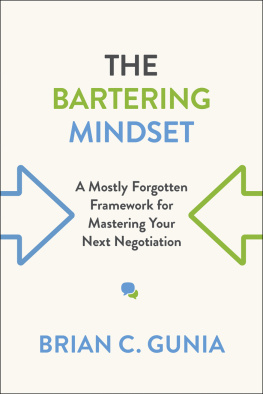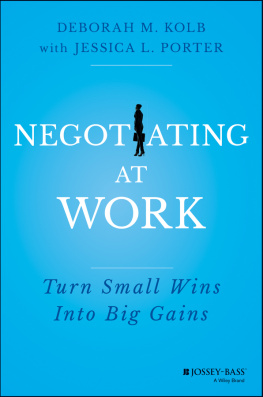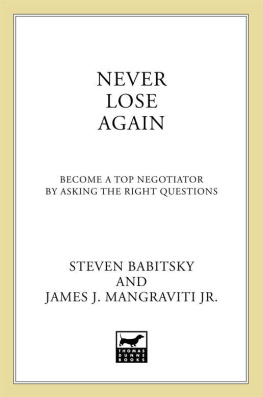THE
NEGOTIATOR
IN YOU
Joshua N. Weiss, Ph.D.
AUDIOGO, RHODE ISLAND
Copyright 2012 by Joshua Weiss
All rights reserved. Published by AudioGO,
Chivers North America, Inc., Rhode Island
AudioGO and colophon are registered
trademarks of Chivers North America, Inc.
Library of Congress Cataloging-in-Publication Data
Weiss, Joshua, [date]
The negotiator in you / Joshua Weiss.
ISBN 978-1-62064-194-1
www.audiogo.com
Designed in the United States of America
Interior Design by Christopher M. Zucker
First Edition
CONTENTS
Internal and External Negotiations:
Getting it from All Sides |
Salary Negotiation:
Why They Dont Hold All the Cards |
Negotiating with Your Boss:
Uphill but Climbable |
Negotiating in a Virtual World:
The Dos and Donts and Things to Consider When Negotiating Virtually |
Emotions in Negotiation:
Hey Take it Easy, Buddy |
Generational Negotiations:
Whats That, Sonny? |
Negotiating Intangibles:
Its What You Cant See That Can Hurt You |
Negotiating through the Holidays:
Jingle Bells, Turkey Legs, and Family |
Getting Them to Play Your Game:
From Competition to Cooperation |
Being Assertive in Negotiation:
Your Inalienable Right |
Making the First Offer:
Should I or Shouldnt I? |
Valuation in Negotiation:
Your Money or Your Life |
Negotiating Big Purchases:
Ill Take That One, That One, and That One |
PREFACE
THIS BOOK IS AN introduction to negotiation specifically for those of you who dont see yourselves as negotiators. Negotiation is a word we all know and yet we dont think it has much relevance to our lives. Negotiation is something other people do in a boardroom or at the peace table. And so you might believe it is not a big part of your life. Well, I would respectfully disagree. The reality is that everyone is a negotiator! We engage in many different kinds of negotiations everydaywith our spouses, parents, children, mortgage lenders, co-workers, or clients. Since negotiation is increasingly ubiquitous in our world you must understand the negotiator in you.
The Negotiator in You is designed to open your eyes to all the negotiations that are going on around you that perhaps you did not previously see as negotiations. From your dealings with credit card companies to conversations with your spouse about what to do with your finances: you are negotiating. Throughout this book you will come to understand the negotiation skills you already possess, how you can improve in places you struggle or are afraid to venture into, and how to approach negotiation in a strategic manner so that you gain a level of confidence that you currently may not possess.
In order to develop the negotiator in you, it is important to begin with a clear definition of negotiation and then analyze some fundamental concepts directly related to the concept and the process of negotiation. As you will come to understand there are a number of popular myths related to negotiation that must be debunked.
While most of us have heard the term negotiation, we cant really define it succinctly. Lets begin with a definition that provides us with a common jumping off point: Negotiation is an interaction between two or more people who seek to meet their interests as best as possible by either reaching agreement or ending the process knowing they can do better elsewhere. First you will notice that this definition is an interaction between two or more interconnected parties. Next we see that negotiation is about meeting ones interests (i.e. those things we need most in a given situation). Finally, note that the end goal is either the achievement of reaching an agreement or the realization that you can better meet your needs elsewhere. This last notion is critically important because many people define negotiation as simply reaching agreement. This definition puts significant pressure on the parties to simply reach agreement even if it is a poor one. So, the definition I propose is not your typical definition of negotiation, but these are fundamental components of negotiation to consider as we examine the negotiation process in more detail.
Next, we must debunk some popularly held myths related to negotiation. Many of these mythsperpetuated in the media and other public forumsgive cursory attention to the art and science of negotiation. After explaining each myth, a more realistic picture of these concepts will be revealed.
MYTH ONE IS THAT NEGOTIATION IS SYNONYMOUS WITH COMPROMISE, MEANING THAT ONE SHOULD BE WILLING TO GIVE UP WHAT IS MOST IMPORTANT IN ORDER TO REACH AGREEMENT.
This is something we hear time and again in varied contexts and it is simply not true. The real problem with compromise is that it is frequently a quick fix solution to a difficult problem. As such, most compromises end up alleviating the stress of the situation, but do not maximize the potential value in a given negotiation situation. The reality is that successful negotiation, in many ways, is about creativity and coming up with unique solutions to complex challenges. Take the following scenario as an example:
Sarah, a representative for Dunning Contractors, was in the throes of a negotiation with Karen, a representative for the City of Cumberland. The negotiations regarded contracting services that Dunning would provide Cumberland as it revamped its reservoir. The two negotiators made good progress on many issues but were stuck on the difference between the amount the vendor (Dunning) was charging and the client (Cumberland) was willing to pay. This gap was approximately $100,000 on a $2,000,000 contract. After much back and forth, the negotiation was on the brink of collapse. Fear swept over both Sarah and Karen that all their hard work would go down the drain. At the last moment Karen said, You know, lets just compromise here and split the difference. It wont be ideal for either of us, but something is better than nothing. After some hemming and hawing Sarah agreed, even though she struggled to figure out how she would explain this agreement to her boss.
What we have here is a classic compromise agreement that seems superficially quite fair given the circumstances, but ultimately stretches each party past their limits immediately putting stress on the two negotiators and their future relationship.
Lets imagine that we can rewind the clock for a moment and go back just before the compromise. We pick up the story once again to determine if another approach to the negotiation was possible.
As a reminder, the two parties are trying to come up with a solution to the $100,000 gap that has emerged. Instead of suggesting that a compromise is the best way to make this deal workwhich is really not the case from either partys perspectiveSarah digs a little deeper.
Sarah tells Karen, Okay, it seems like we have made very good progress thus far and we are left with this one issue. I just want to check with you, is there anything else that you and the City of Cumberland value that is not part of what we have discussed? Karen thinks it over for a few moments and explains that there are two additional items that are important to her and the city that have not been included in the conversation.











